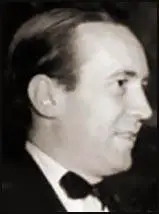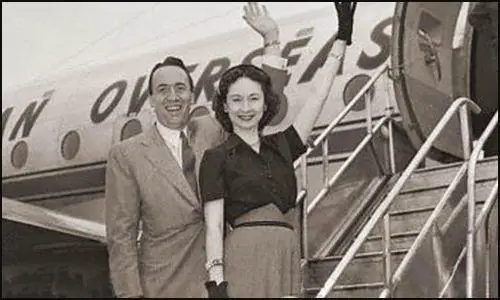Richard Kollmar

Richard Kollmar, the son of a businessman, was born in Brooklyn on 31st December, 1910. A rebellious child, he was sent to a school for problem boys in New Jersey. Later he attended Tusculum College in Tennessee. It was while he was a student he became involved in acting and won a place at Yale Dramatic School.
In 1938 Kollmar obtained a leading role in Knickerbocker Holiday . This was followed by the musical, Too Many Girls . The New York Times described him as "an exuberant comedian unspoiled by cleverness". Kollmar married Dorothy Kilgallen in April, 1940. The couple had three children (Jill, Richard and Kerry).
In April 1945 the couple began a daily morning radio show, Breakfast with Dorothy and Dick. The programme went out live: Monday to Saturday (8.15 to 8.55 a.m.) and Sunday (11.30 to 12.00). Over the years the programme was gradually commercialized. Companies paid to have their products mentioned over breakfast and theatre producers arranged to have their plays and musicals discussed over breakfast. Films and books were also promoted by the hosts.
Kollmar also worked as a theatre producer. This included Early to Bed , By Jupiter , Leave It to the Girls and Dream With Music . He also owned and operated a nightclub in New York City called The Left Bank. He worked closely with the Arts Students League and started a small art gallery.

Dorothy Kilgallen took an interest in the assassination of John F. Kennedy. In September 1964 she reported in the New York Journal American that Jack Ruby, J. D. Tippet and Bernard Weismann had a two hour meeting at the Carousel Club on 14th November, 1963.
Later Kilgallen managed to obtain a private interview with Jack Ruby. She told friends that she had information that would "break the case wide open". Aware of what had happened to Bill Hunter and Jim Koethe, Kilgallen handed a draft copy of her chapter on the assassination to her friend, Florence Smith.
On 8th November, 1965, Dorothy Kilgallen, was found dead in her New York apartment. She was fully dressed and sitting upright in her bed. The police reported that she had died from taking a cocktail of alcohol and barbiturates. The notes of her interview with Ruby and the article she was writing on the case had disappeared.
Richard Kollmar committed suicide on 7th January, 1971.
Primary Sources
(1) Lee Israel, Kilgallen (1979)
During one of her (Kilgallen’s) visits - sometime in March, before the verdict – she prevailed upon Joe Tonahill to make arrangements through Judge Brown for a private interview with Jack Ruby.
Brown, awestruck by Dorothy, acceded readily to Tonahill’s request. The meeting room in the jailhouse was bugged, and Tonahill suspected that Brown’s chambers were as well. Brown and Tonahill chose a small office off the courtroom behind the judge’s bench. They asked Ruby’s ubiquitous flank of four sheriff’s guards to consent to remain outside the room.
Dorothy was standing by the room during a noon recess. Ruby appeared with Tonahill. The three entered the room and closed the door. The defendant and Dorothy stood facing each other, spoke of their mutual friend, and indicated that they wanted to be left alone. Tonahill withdrew. They were together privately for about eight minutes, in what may have been the only safe house Ruby had occupied since his arrest.
Dorothy would mention the fact of the interview to close friends, but never the substance. Not once, in her prolific published writings, did she so much as refer to the private interview. Whatever notes she took during her time alone with Jack Ruby in the small office off the judge’s bench were included in a file she began to assemble on the assassination of John F. Kennedy.
(2) New York Journal American (15th November, 1965)
The death of Dorothy Kilgallen, Journal-American columnist and famed TV personality, was contributed to by a combination of moderate quantities of alcohol and barbiturates, a medical examiner's report stated today.
As many personalities whose multiple duties and responsibilities demand unceasing attention, Miss Kilgallen experienced recurring tensions in meeting her deadlines for performances - both as a newspaperwoman and TV performer.
In his report today, Dr. James Luke, Assistant Medical Examiner, said that although Miss Kilgallen had only "moderate amounts of each," the effect of the combination had caused depression of the central nervous system "which in turn caused her heart to stop."
(3) William Penn Jones, The Midlothian Mirror (November 25, 1965)
I have a concern for the strange things happening in America in recent months. With the passing of the second anniversary of the murder of President Kennedy, we take not of some of the strange things which continue to plague those around the principals.
Miss Dorothy Kilgallen joins the growing list of persons who have died after a private interview with one of the two members of the Jack Ruby-George Senator team. We have printed the strange deaths of Bill Hunter and Jim Koethe after they had a private interview with George Senator and Ruby’s attorney, Tom Howard. Hunter and Koethe were murdered. Lawyer Tom Howard died under strange circumstances...
Now Miss Kilgallen dies under clouded circumstances. During the Ruby trial in Dallas, Judge Joe B. Brown granted Miss Kilgallen a privilege given no other newsman. She had thirty minutes alone in a room with Jack Ruby. Even the guards were outside the door. Miss Kilgallen told some of what went of during the interview in her columns. But was someone afraid she knew more? Is she another victim of possibly knowing the secret that still moves in the troubled mind of Jack Ruby?...
What is happening in our land? How many murders of persons connected in some way with the assassination principals can go unnoticed by our people? How many lies must we prove on The Warren Commission before a demand for reopening becomes a commanding one?
(4) William Penn Jones, Volume I: Forgive My Grief (1966)
Now we can add to that list of strange deaths that of Miss Dorothy Kilgallen. Miss Kilgallen joins Bill Hunter, Jim Koethe, Tom Howard and others. Miss Kilgallen is the only journalist who was granted a private interview with Jack Ruby since he killed Lee Oswald. Judge Joe B. Brown granted the interview during the course of the Ruby trial in Dallas – to the intense anger of the hundreds of other news people present.
(5) David Welsh, Ramparts (November, 1966)
We know of no serious person who really believes that the death of Dorothy Kilgallen, the gossip columnist, was related to the Kennedy assassination. Still, she was passionately interested in the case, told friends she firmly believed there was a conspiracy and that she would find out the truth if it took her all her life.
Miss Kilgallen was the first to make public the existence of Acquilla Clemons, a witness to the Tippit killing whose name does not appear once in the Warren Report or volumes. She was also the only reporter ever to interview Jack Ruby privately since the killing of Oswald. During the Ruby trial, which she covered for the now defunct New York Journal-American, Judge Joe E. Brown granted her 30 minutes alone with Ruby in the judge's chambers; the other reporters were furious.
One of the biggest scoops of Miss Kilgallen's career came when she pirated the transcript of Ruby's testimony before the Warren Commission and ran it in the Journal-American. Thousands of New Yorkers were shocked at the hopelessly inept questioning of Ruby by Chief Justice Warren, by Warren's almost deliberate failure to follow up the leads Ruby was feeding him.
Miss Kilgallen died in her bed on November 8, 1965. Dr. James Luke, a New York City medical examiner, said the cause of death was "acute barbiturate (sic) and alcohol intoxication, circumstances undetermined." Dr. Luke said there were not high enough levels of either alcohol or barbiturates (sic) to have caused death, but that the two are "additive" and together are quite enough to kill. This cause of death, he observed, is not at all uncommon. Was it suicide? Accident? Murder? - Dr. Luke said there was no way of determining that.
As we say, Dorothy Kilgallen probably does not belong on any list of Kennedy-related deaths. But questions do remain. An editor of Screen Stars magazine, Mary Brannum, says she received a phone call a few hours before Dorothy's body was discovered, announcing that she had been murdered. Miss Kilgallgen's "What's My Line" makeup man said that shortly before her death she vowed she would "crack this case." And another New York show biz friend said Dorothy told him in the last days of her life: "In five more days I'm going to bust this case wide open."
(6) William Penn Jones, Volume II: Forgive My Grief (1967)
Tom Howard knew too much from Ruby and he knew too well how the Dallas power structure and Police Department worked. Howard had to die.
At the Ruby trial in Dallas during March of 1964, Dorothy Kilgallen had a private interview during one of the noon recesses with Judge Joe B. Brown. This was immediately followed by a thirty minute private interview with Jack Ruby in Judge Brown’s chambers. Even Ruby’s bodyguards were kept outside the Judge’s chambers. Joe Tonahill and others thought the meeting room in the jail was “bugged,” but it is doubtful if the Judge’s own chambers would be bugged. Judges have the power of contempt of court for such irregularities.
This then, was the second person Ruby had talked to who could know for whom Ruby was acting; therefore Miss Kilgallen had to be silenced along with Tom Howard.
Shortly before her death, Miss Kilgallen told a friend in New York that she was going to New Orleans in 5 days and break the case wide open. Miss Kilgallen 52, died November 8, 1965, under questionable circumstances in her New York home. Eight days after her death, a ruling was made that she died of barbiturates and drink with no quantities of either ingredient being given.
Also strangely, Miss Kilgallen’s close friend, Mrs. Earl E.T. Smith, died two days after Miss Kilgallen. Mrs. Smith’s autopsy read that the cause of death was unknown.
Many skeptical newsmen have asked: “If Miss Kilgallen knew anything, surely as a journalist wouldn’t she have left some notes?” This is a legitimate question. Possibly Mrs. Smith was the trusted friend with the notes. No one will ever know now.

